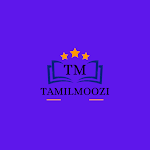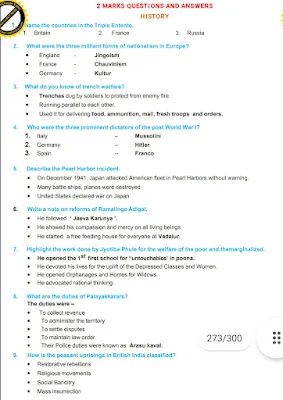1. Name the countries in the Triple Entente.
1. Britain 2. France 3. Russia
2. What were the three militant forms of nationalism in Europe?
• England - Jingoism
• France - Chauvinism
• Germany - Kultur
3. What do you know of trench warfare?
• Trenches dug by soldiers to protect from enemy fire.
• Running parallel to each other.
• Used it for delivering food, ammunition, mail, fresh troops and orders.
4. Who were the three prominent dictators of the post World War I?
1. Italy – Mussolini
2. Germany – Hitler
3. Spain -- Franco
5. Describe the Pearl Harbor incident.
• On December 1941, Japan attacked American fleet in Pearl Harbors without warning.
• Many battle ships, planes were destroyed.
• United States declared war on Japan.
6. Write a note on reforms of Ramalinga Adigal.
• He followed ‘ Jeeva Karunya ’.
• He showed his compassion and mercy on all living beings.
• He started a free feeding house for everyone at Vadalur.
7. Highlight the work done by Jyotiba Phule for the welfare of the poor and the marginalized.
• He opened the 1st first school for “untouchables’ in poona.
• He devoted his lives for the uplift of the Depressed Classes and Women.
• He opened Orphanages and Homes for Widows.
• He advocated rational thinking.
8. What are the duties of Palayakkarars?
The duties were –
• To collect revenue
• To administer the territory
• To settle disputes
• To maintain law order
• Their Police duties were known as Arasu kaval.
9. How is the peasant uprisings in British India classified?
• Restorative rebellions
• Religious movements
• Social Banditry
• Mass insurrection
10. Name the territories annexed by the British under the Doctrine of Lapse.
• Satara
• Jhansi
• Nagpur
How many types of fundamental rights are listed by the Indian Constitution ? There are 6
types of fundamental rights
1. Right to Equality
2. Right to Freedom
3. Right against Exploitation
4. Right to Religion
5. Cultural of Educational Rights
6. Right to Constitutional Remedies.
2. What are the classical languages in India?
1. Tamil 2. Sanskrit 3. Telugu 4. Kannada 5. Malayalam 6. Odiya
3. What is national emergency?
• National emergency can be declared on the basis of
war,foreign Aggression,or armed rebellion In India.
• The President under Article 352 can declare national emergency.
4. What are the different categories of Ministers at the Union level?
The Ministers are classified as three ranks.
• Cabinet Ministers
• Ministers of State
• Deputy Ministers.
5. Explain India’s nuclear policy.
The two themes of India’s nuclear policy are
i) No first use ii) Credible minimum deterrence.
6. List any four guiding principles of Panchsheel?
• Mutual respect for each other’s territorial integrity and sovereignty.
• Mutual non - aggression
• Mutual non - interference
• Equality and co-operation for mutual benefit.
• Peaceful co-existence.
7. Mention the main tools of foreign policy.
1. Treaties and executive agreements
2. Appointing Ambassadors
3. Foreign Aid
4. International Trade
5. Armed Forces.
8. Mention the member countries of BRICS.
1. Brazil
2. Russia
3. India
4. China
5. South Africa
1. Explain the salient features of the Constitution of India.
1. Written Constitution
2. Lengthiest constitutions of the world.
3. Partly Rigid and Partly Flexible
4. Drawn from different sources
5. Parliamentary democracy
6. Secularism
7. Federalism
8. Judicial Independence
9. Provision of fundamental rights
10. Principles for a welfare state
11. Single citizenship
12. Emergency Provisions
13. Protection of minorities
2. Point out the Fundamental Rights.
Right to Equality
• Article 14 - Equality before law.
Right to Freedom
• Freedom of Speech & Education
Right against Exploitation
• Prohibition of forced labour.
Right to Religion
• Freedom of practice of any religion
Cultural & Educational Rights
• Protection of language & culture of minorities
Rights to Constitutional Remedies
Remedy for the violation of Citizens rights
3. Describe the Executive and Judicial powers of the President of India.
• The president is the nominal and executive authority.
• He is the First citizen of India.
Executive powers
• He is responsible for making a wide variety of appointments.
• He appoints - Prime Minister - council of Ministers
Judicial Powers
• Article 72 He grant Pardon, reprieves,
2. Write the challenges of Globalization.
Global Competition
• ( In wages, labour rights and employment practices.)
Consuming junk food
• Degradation of health and spread of diseases.
Various Problems
• Child labour and slavery.
• Environmental degradation.
• Global imbalance.
3. Elucidate why the Green Revolution was born.
1. Famine
• Food production decreased
2. Main cause
• The growth of population in India.
3. U S A (‘Ship to Mouth’ existence)
• Extended assistance through its Public Law 480 (PL 480) scheme.
4. Key Contributors of the Green Revolution
• Dr. M.S.Swaminathan and Central Minister C.Shanmugam
5. Effect of Green Revolution 1967
• Self-sufficiency in food grain production.
• Rural employment
• Economic Growth
4. Explain the Role of an Entrepreneur.
• They promote development
• Help to industrializing rural and backward areas
• Increase the GDP and PCI.
• Contribute the development of society.
• Giving better goods and employment.
• Helps to improve their standard of living
10th class|MLM|English Medium|All Subject
பத்தாம் வகுப்பு தமிழ் ஆங்கிலம் கணிதம் அறிவியல் சமூக அறிவியல் பாடத்திற்கான மெல்ல கற்கும் மாணவருக்கான சிறப்பு கையேடு கீழே PDF வடிவில் கொடுக்கப்பட்டுள்ளது
1. Highlight the provisions of the Treaty of Versailles relating to Germany.
• Germany was reduced.
• Germany had to pay 6,600 million pounds.
• Allowed to have Air force and Submarines.
• Union of Austria and Germany was forbidden.
• All German colonies became mandated.
• Alsace – Loraine was returned to France.
2. Analyse the effects of World War – II.
• Two main blocks - America and Russia.
• Cold war between America and Russia.
• Race of Nuclear weapons.
• Colonies became independent.
• UN came into existence for peace.
• Women economically independent.
• Socio economic changes.
3.Asses the structure and the activities of the UN.
• UN Headquarter - Newyork.
• Started on 14th October,1945.
• 193 member nations
Structure
• General Assembly
• Secretariat
• Security Council (15 members).
• The Economic and Social Council Organisation.
• The trusteeship council
• The international court of justice.
• World Bank
8. What is urbanization? Explain its problems.
• The Process of Society’s Transformation
• Rural to Urban is known as Urbanization.
Major problems of Urbanization:
• It creates urban sprawl.
• Makes overcrowding in urban centers.
• Leads to the formation of slums.
• Increases traffic congestion in cities.
• Creates water scarcity in cities.
• Creates drainage problem.
9. Explain the importance of satellite communication in India.
• Weather forecasting
• Monitoring of natural calamities
• Relaying signals to television, telephone, radio, mobile phones.
Types of Satellite
1. INSAT 2. IRS
Major Communication Satellites
• GSAT SERIES
• KALPANA-1
• HAMSAT
• EDUSAT
• GSAT-7A
• Chandrayan -2
10. Write an account on river Cauvery.
• Cauvery originates at Tala cauvery ( Karnataka- Western Ghats)
• About 416 km of its course falls in Tamil nadu.
• It forms Hogenakkal waterfalls in Dharmapuri district.
• Tributaries are Bhavani, Noyyal and Amaravathi
Two branches
• Northern branch - Kollidam
• Southern branch - Cauvery
• Cauvery delta is formed - Trichy, Thanjavur and Nagai.
• Cauvery delta is called as the “Garden of Southern India”.






0 கருத்துகள்